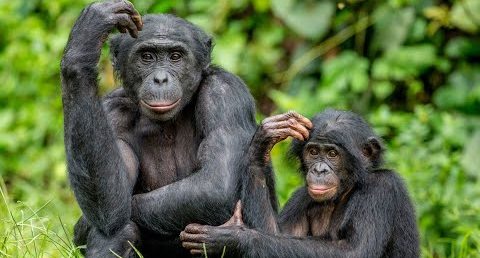TRUE BONOBO LOVE

2 – Bonobos are smaller than chimpanzees, with a more slender build and a darker face. They are also known for their advanced social and cognitive abilities. Bonobos are able to use tools in the wild, such as using sticks to extract food from crevices, and have been observed using sign language to communicate with humans in captivity.
3 – Unlike many other primates, bonobos live in female-dominated groups and are known for their cooperative and peaceful nature. They use sex as a way to diffuse tensions and establish social bonds, which has led to them being referred to as the “make love, not war” primates.
4 – Bonobo society is characterized by cooperation, sharing, and mutual grooming, rather than competition and aggression. Females form the core of bonobo social groups and maintain close relationships with one another, while males play an important role in the group, but tend to be less dominant and aggressive than male chimpanzees.
5 – Bonobos have a diverse vocal repertoire and communicate through a range of sounds including screams, grunts, and even laughter. They also use body language, facial expressions, and gestures to convey meaning and emotion.
6 – Bonobos are considered endangered due to habitat loss, poaching, and disease. The destruction of the Congo Basin rainforest is the primary threat to bonobo survival, as it reduces their habitat and the availability of food. Bonobos are also hunted for their meat and sold in local markets as a delicacy. Diseases, such as the Ebola virus, are also a significant threat to bonobos.
7 – The study of bonobos has led to a greater understanding of the evolution of human behavior and society. For example, their use of sex as a social tool challenges traditional views of human sexuality and has led to a better understanding of the role of sexuality in social behavior.
8 – Bonobos are also important for their role in conservation efforts in the Democratic Republic of the Congo. They are considered a flagship species for conservation and efforts to protect them often benefit other species and the ecosystem as a whole.
9 – The conservation of bonobos also requires the involvement and support of local communities. This can be challenging because many communities rely on the forest for their livelihoods and may view bonobos as a threat to their crops or livestock.
10 – Despite the challenges facing bonobos, there is hope for their survival. Conservation organizations are working to protect bonobo habitat, reduce poaching and hunting, and involve local communities in conservation efforts. Increased public awareness and education about bonobos can also help to raise awareness of their plight and promote conservation efforts.












